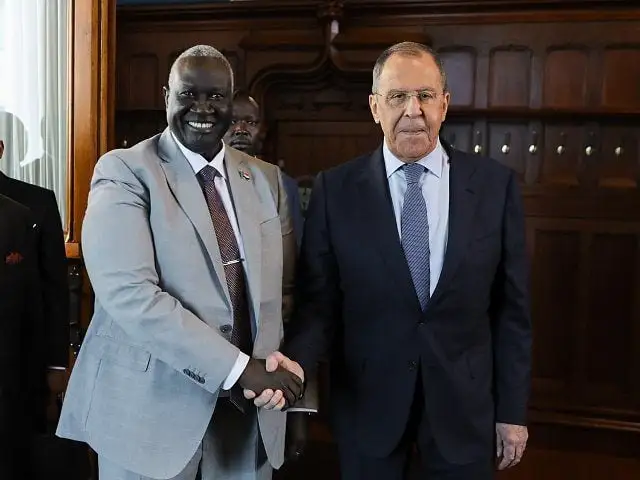Agar maintains Sudan’s ties with Russia during Moscow visit

Malik Agar meets Russian FA Minister Sergey Lavrov, June 29, 2023 (Photo: Russian Foreign Ministry)
MOSCOW –
Malik Agar, the new deputy chairman of Sudan’s Sovereignty Council, is visiting Russia along with the undersecretary of the Ministry of Foreign Affairs and other officials. Agar’s delegation held talks with Russian Foreign Affairs Minister Sergey Lavrov and the Russian envoy to Africa and the Middle East, Deputy Foreign Minister Mikhail Bogdanov.
Agar tweeted from Moscow yesterday that he provided the Russian officials with “a thorough explanation of the developments in Sudan since the outbreak of the Rapid Support Forces (RSF) rebellion on April 15, including the field developments, humanitarian implications, and the impact on Sudan and neighbouring countries”.
The meeting also covered regional and global initiatives and efforts to address the situation, as well as Sudan’s position on the Integrated Transition Support Mission in Sudan (UNITAMS) and its head, Volker Perthes. The Russian side acknowledged Sudan’s stance on the UN mission and its decision to declare Perthes a persona non grata.
Foreign Minister Lavrov expressed the Russian Federation’s solidarity with the Sudanese government and people, as well as their support for Sudan’s “existing legitimate institutions”. He emphasised that the crisis in Sudan is an internal matter, and its resolution “lies in the hands of the Sudanese themselves”. The Russian government however is ready “to assist the Sudanese people whenever requested”.
Agar and Lavrov agreed to strengthen bilateral relations in various fields through established mechanisms. Additionally, the Russian side expressed its desire for El Burhan to attend the upcoming Russian-African Summit in Saint Petersburg, scheduled for the end of July.
Who is Malik Agar?
Malik Agar was appointed vice president of Sudan’s Transitional Sovereignty Council (RSC) by army commander and TSC chair Abdelfattah El Burhan on May 19, after Mohamed ‘Hemedti’ Dagalo, Commander of the paramilitary RSF, was removed from this position.
Agar has a long history in Sudanese politics. In 1985, he joined the armed opposition represented by the Sudan People’s Liberation Movement (SPLM) under the leadership of John Garang in southern Sudan.
After the signing of the Comprehensive Peace Agreement in 2005 by the SPLM and the Sudanese government, Agar returned to Blue Nile state, where he was born. During the 2021 general elections, Agar was elected governor of Blue Nile state.
After the secession of southern Sudan in 2011, Malik Agar assumed leadership of the Sudan People’s Liberation Movement-North faction (SPLM-N). This led to tensions between the rebel forces and the Sudanese army, which resulted in his removal from power.
In November that year, Agar and his movement formed the Sudan Revolutionary Front (RSF) rebel alliance together with three Darfur movements. Later, several other armed opposition groups would join the SRF.
A few years later, conflicts emerged within the SPLM-N, and vice president Abdelaziz El Hilu submitted his resignation in early 2017 because of “irreconcilable differences”.
Consequently, the SPLM-N split into two factions led by Abdelaziz El Hilu (SPLM-N El Hilu) and Malik Agar (SPLM-N Agar) respectively. The El Hilu faction, based in Kauda in the Nuba Mountains, continued with most of the SPLM-N combatants in South Kordofan and the Blue Nile area. Agar retained influence over parts of the Blue Nile region. The two factions fought heavy battles after the split.
Following the signing by the RSF parties and the Sudanese government of the Juba Peace Agreement in the South Sudanese capital October 2020, Agar was appointed as member of the Sovereignty Council. After the military coup staged by El Burhan and Hemedti one year later, most civilian members of the Council resigned. Agar and rebel leader El Hadi Idris did not.
Previous Moscow visit
Agar’s visit to Moscow is not the first time a Sudanese official aimed to strengthen ties with Russia. His predecessor Hemedti visited Moscow in February last year, for a week-long visit which began before the invasion of Ukraine on February 24 and concluded on March 2.
Hemedti met with Alexander Fomin, the Russian Deputy Minister of Defence, and expressed his hope to advance relations between Sudan and Russia and strengthen cooperation in various fields.
Hemedti’s visit drew criticism from Sudanese political and civil society. Some viewed the visit as an “adventure” given Sudan’s isolation following the October 2021 coup.
Political analyst Magdi El Gizouli suggested that the visit, reportedly facilitated by Russian Wagner mercenaries, aimed to secure Hemedti’s continuation in power and “ensure the exploitation of Sudan’s resources”.











 and then
and then